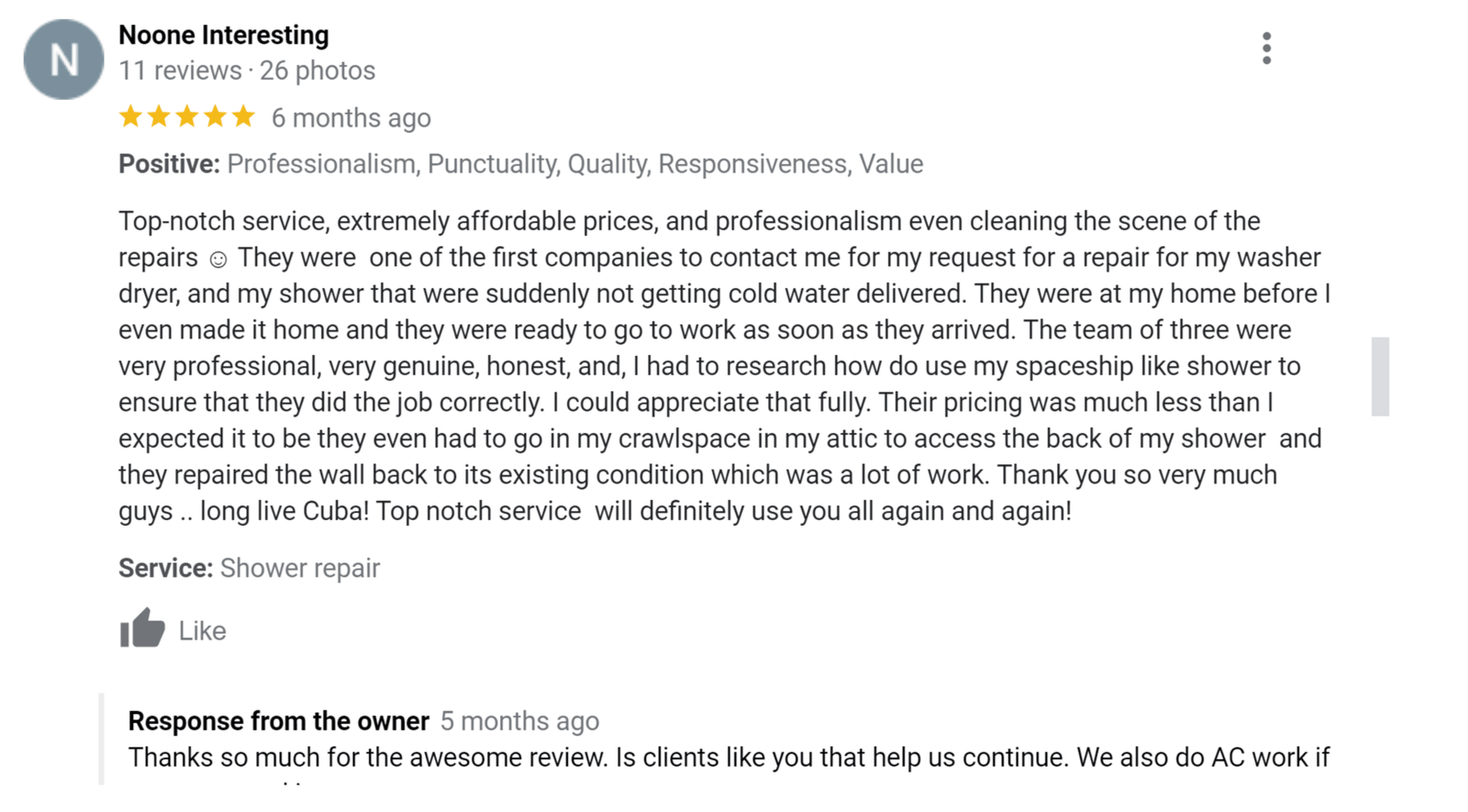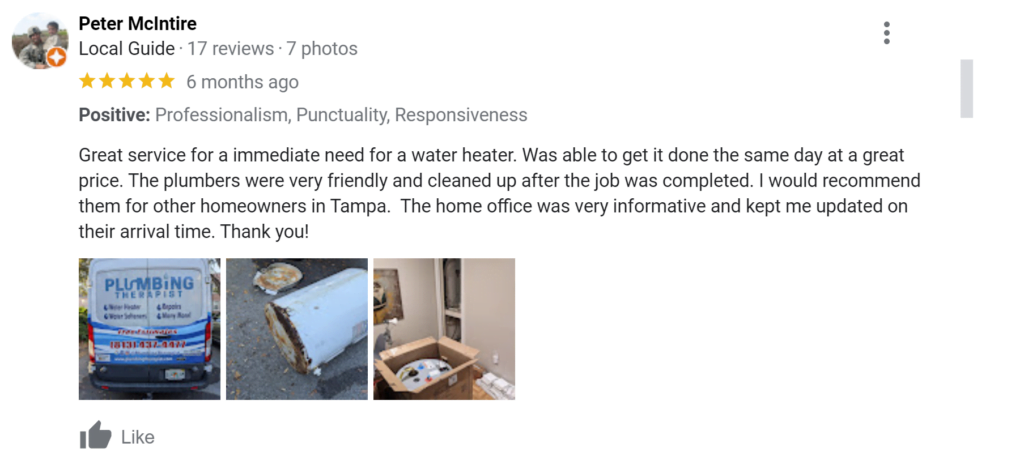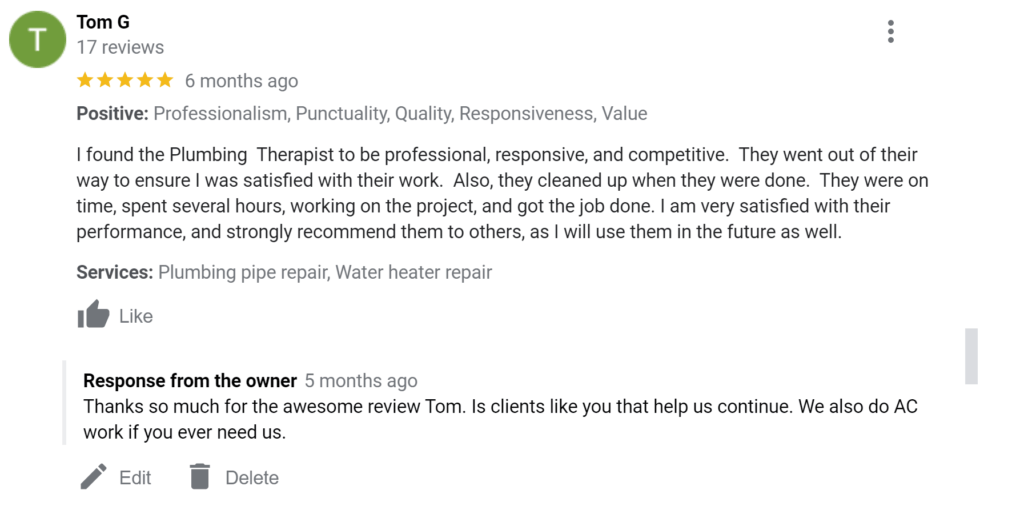No Hot Water
Experiencing No Hot Water? Plumbing Therapist in Tampa Bay offers top-notch water heater repair and replacement services. Get your hot water flowing again!
Do You Need Our Help ?
Feel free to contact us now
$99 Water Heater Flush + Free Plumbing System Inspection
No Hot Water in Tampa Bay
Quick and Reliable No Hot Water Services in Hillsborough County, Pinellas County, and Pasco County
Are you tired of facing icy showers and shivering through your daily routine? Don’t let the lack of hot water disrupt your comfort. At Plumbing Therapist in Tampa Bay, we specialize in fixing all your hot water woes. Our expert plumbers are here to ensure you enjoy warm showers, clean dishes, and cozy laundry days without any hiccups.
Common Causes of No Hot Water:
- Faulty Water Heater: Over time, water heaters can develop issues, causing a lack of hot water. We can diagnose and repair or replace your water heater efficiently.
- Pilot Light Problems: Gas water heaters often face pilot light issues. Our experts can relight it or address any related problems.
- Sediment Buildup: Sediment accumulation can affect the heating element’s efficiency. We’ll flush your system and ensure optimal performance.
- Electrical Issues: Electric water heaters might experience electrical problems. Our skilled electricians can identify and resolve these issues.
Our No Hot Water Solutions:
- 24/7 Emergency Service: No hot water can be an emergency, especially in colder months. We’re available around the clock to fix your hot water problems promptly.
- Water Heater Repair: Our technicians can diagnose and repair water heater issues efficiently, restoring your hot water supply.
- Water Heater Replacement: If your unit is beyond repair, we offer top-quality water heater replacements from trusted brands, ensuring long-term reliability.
- Maintenance Services: Prevent future hot water troubles with our routine maintenance plans, keeping your water heater in optimal condition.
Why Choose Plumbing Therapist:
- Licensed and Experienced: Our team consists of licensed, experienced plumbers and electricians.
- Same-Day Service: We aim to resolve your hot water issues on the same day you call.
- Transparent Pricing: We provide upfront pricing, so you know the cost before we start the work.
- Customer Satisfaction: Our goal is to leave you 100% satisfied with our services.
Contact Us for Hot Water Solutions, don’t endure another day without hot water. Contact Plumbing Therapist in Tampa Bay today. We’ll quickly diagnose the issue and provide the right solution to get your hot water flowing again. Your comfort is our priority.

Why partner with Plumbing Therapist?
Quality, Affordability, and Expertise.

No Hidden or Unexpected Charges

Free Estimates & Online Booking Available

Professionally Trained Technicians

Honesty is Guaranteed

Quick Communication & Service Within 24 Hours

400+ 5 Star Reviews

Why is it necessary to have hot water at home?
Hot water is essential in homes for several reasons:
Personal Hygiene: Hot water is crucial for bathing and maintaining personal hygiene. It helps in removing dirt, oil, and sweat from the body effectively, leaving you feeling clean and refreshed.
Cleaning: Hot water is more effective in cleaning dishes, laundry, and household surfaces. It can dissolve grease and grime, making cleaning tasks easier and more efficient.
Comfort: Hot water is essential for comfort, especially in colder climates. It provides warmth and comfort during showers, making them enjoyable and relaxing.
Health: Hot water is often used for medicinal purposes, such as soothing sore muscles, relieving congestion, and promoting relaxation. It’s also essential for sterilizing items like baby bottles and medical equipment.
Cooking: Hot water is needed for cooking various dishes, from boiling pasta and vegetables to making hot beverages like tea and coffee.
Sanitization: Hot water is critical for maintaining a sanitary environment in the kitchen and bathroom. It helps kill bacteria and germs, reducing the risk of illness.
Home Systems: Many home systems, such as water heaters, radiators, and underfloor heating, rely on hot water to operate efficiently and provide heating to the entire home.
Energy Efficiency: Having a reliable hot water supply allows homeowners to use energy-efficient appliances like dishwashers and washing machines that require hot water, which can lead to lower energy bills over time.
Hot water is not only a matter of convenience but also a necessity for maintaining personal hygiene, cleanliness, and overall well-being in a household. It supports various daily activities and contributes to a comfortable and healthy living environment.
If you would like more information, feel free to give them a call at (813)-437-4477 or you can book online and get their latest discount!
Customer Testimonials: Real Experiences with Plumbing Therapist
We proudly share the experiences and stories of our valued clients. Their feedback provides a glimpse into the quality of service and commitment to excellence we uphold at Plumbing Therapist. You'll read firsthand how our plumbing solutions have improved comfort and efficiency in homes across Tampa Bay. These testimonials illustrate our dedication to customer satisfaction and the difference our expert services can make.




Your questions answered
Common No Hot Water Questions:
Why is there no hot water coming from my faucets and shower?
The lack of hot water coming from your faucets and shower can be due to several reasons, and troubleshooting the issue can help identify the cause. Here are some common reasons why there might be no hot water:
Pilot Light Issues (Gas Water Heater): If you have a gas water heater, the pilot light may have gone out or is malfunctioning. Check the pilot light and relight it if necessary. If it continues to go out, there may be a more significant issue that requires professional attention.
Tripped Circuit Breaker (Electric Water Heater): For electric water heaters, a tripped circuit breaker can cut off power to the heating element. Check your electrical panel and reset the breaker if needed.
Thermostat Problems: Water heaters have thermostats that control the temperature of the water. If the thermostat is set too low or is malfunctioning, it can result in insufficient hot water. Adjust or replace the thermostat as required.
Sediment Buildup: Over time, sediment can accumulate in the bottom of the tank, insulating the heating element and reducing its efficiency. Flushing the tank to remove sediment buildup can restore hot water flow.
Water Heater Age: Water heaters have a limited lifespan. If your water heater is old and showing signs of wear, it may be time for a replacement.
Water Heater Leaks: A leak in the water heater can cause a loss of hot water. Check for visible leaks and address them promptly.
Gas Supply Issues (Gas Water Heater): Ensure that your gas supply to the water heater is not interrupted. If there’s an issue with the gas line, you may need to contact a professional.
Pressure Relief Valve (PRV) Issues: If the PRV on your water heater is leaking or discharging water, it can result in lower hot water pressure. This valve may need to be replaced.
Plumbing Issues: Sometimes, issues within the plumbing system, such as a blockage or a faulty valve, can disrupt the flow of hot water to faucets and showers. A plumber can diagnose and resolve these problems.
Water Heater Size: If you have a smaller water heater, it may struggle to meet the hot water demands of your household. Consider upgrading to a larger unit if needed.
If you are unsure about how to troubleshoot or address the issue, it’s advisable to contact a professional plumber or water heater technician. They can assess the situation, diagnose the problem accurately, and perform any necessary repairs or replacements to restore hot water to your home.
How can I relight the pilot light on my gas water heater?
Relighting the pilot light on your gas water heater is a relatively simple process, but it should be done carefully to ensure safety. Here are the steps to relight the pilot light:
Note: Before attempting to relight the pilot light, make sure you read and follow the manufacturer’s instructions that are typically located on the water heater. Also, turn off the gas supply if you smell gas or suspect a gas leak. In such cases, contact a professional immediately.
Locate the Control Knob: You will need to access the area near the bottom of your gas water heater where the pilot light is located. Typically, there is a small access panel covering this area. Remove the panel to access the control knob.
Turn the Control Knob to “Pilot”: On the control knob, you should see settings like “Off,” “Pilot,” and “On.” Turn the knob to the “Pilot” position.
Press and Hold the Knob Down: While holding the control knob in the “Pilot” position, locate the pilot burner. It is a small tube that extends from the gas control valve to the pilot assembly. While holding the control knob down, use a long lighter or match to ignite the pilot burner inside the access opening.
Continue Holding the Knob: After the pilot light is lit, continue to hold the control knob down for about 30 seconds. This allows the thermocouple (a safety device) to heat up and signal that the pilot is stable.
Release the Control Knob: After holding it for 30 seconds, release the control knob. The pilot light should remain lit. If it goes out, wait a few minutes, and repeat the process.
Set the Control Knob to “On”: Once the pilot light is stable, turn the control knob from “Pilot” to “On.” This will allow the main burner to ignite when hot water is needed.
Replace the Access Panel: Securely replace the access panel that covers the pilot light area.
Check for Proper Operation: Check to ensure that hot water is now flowing and that the pilot light remains lit when the main burner is active.
If you encounter any issues during this process or if the pilot light continues to go out, it may indicate a problem with the thermocouple, gas control valve, or other components of the water heater. In such cases, it’s advisable to contact a professional plumber or technician to diagnose and repair the issue for safety reasons.
Do you offer emergency hot water heater repair services?
As Plumbing Therapist in Tampa Bay, we understand that hot water issues can be urgent and disruptive. That’s why we offer 24/7 emergency hot water heater repair services. Whether your water heater has suddenly stopped working or you’re facing any other plumbing emergencies related to hot water, our team of experienced professionals is here to assist you promptly. Your comfort and peace of mind are our top priorities. Contact us anytime, day or night, for reliable emergency hot water heater repair services.
Is my water heater malfunctioning?
If you suspect that your water heater is malfunctioning because you’re experiencing a lack of hot water or other issues, it’s essential to look for signs of problems and take appropriate steps. Here are common signs that your water heater may be malfunctioning:
No Hot Water: The most obvious sign is the absence of hot water when you turn on the hot water tap or shower.
Inconsistent Hot Water: If you notice that the hot water supply is inconsistent, with water sometimes turning cold during use, this could indicate a malfunction.
Strange Noises: Unusual noises such as popping, rumbling, or hissing coming from the water heater can indicate sediment buildup or other issues.
Leaking: Any visible leaks around the water heater or in the surrounding area may suggest a problem with the tank or components.
Low Hot Water Pressure: Reduced hot water pressure can be a sign of sediment buildup or a blockage in the pipes connected to the water heater.
Discolored Water: If your hot water is discolored, it might indicate corrosion or rust inside the tank.
Fluctuating Water Temperatures: If the water temperature fluctuates significantly while using hot water, it could be a sign of a faulty thermostat or heating element.
Higher Energy Bills: A malfunctioning water heater may work less efficiently, leading to increased energy bills.
If you observe any of these signs, here are the steps to take:
Safety First: Before investigating further, ensure your safety by turning off the power supply (for electric heaters) or the gas supply (for gas heaters). If you’re uncertain, it’s best to contact a professional plumber.
Check the Pilot Light (Gas Heaters): If you have a gas water heater, verify if the pilot light is lit. If it’s out, follow the manufacturer’s instructions to relight it. If it doesn’t stay lit, there may be an issue with the pilot assembly or thermocouple.
Inspect for Leaks: Check for any visible water leaks around the water heater. If you find leaks, turn off the water supply to the heater and contact a plumber.
Listen for Noises: Pay attention to any unusual noises coming from the water heater. These sounds could indicate sediment buildup, which can be resolved through flushing or maintenance.
Contact a Professional: If you’re unable to identify or address the issue, or if you have safety concerns, it’s advisable to contact a professional plumber or water heater technician. They can diagnose the problem accurately and recommend the necessary repairs or replacements.
Regular maintenance and prompt attention to signs of water heater issues can help prolong the lifespan of your unit and ensure you have a reliable supply of hot water in your home.
Are there any routine maintenance tasks I should perform to prevent hot water problems?
Yes, performing routine maintenance tasks on your hot water heater can help prevent problems, extend its lifespan, and ensure it operates efficiently. Here are some essential maintenance tasks to consider:
1. Check the Temperature Setting:
Ensure that the temperature on your water heater is set to a safe and efficient level (usually around 120°F or 49°C). This helps prevent scalding and reduces energy consumption.
2. Test the Pressure Relief Valve (PRV):
Regularly test the PRV by lifting the lever and allowing some water to escape. This ensures that the valve is functioning correctly and can prevent excessive pressure buildup inside the tank.
3. Drain and Flush the Tank:
Sediment can accumulate at the bottom of the tank over time, reducing heating efficiency and potentially causing damage. Drain and flush the tank annually to remove sediment buildup. Follow your manufacturer’s instructions for this task.
4. Insulate Hot Water Pipes:
Insulating the hot water pipes connected to your water heater can help maintain hot water temperature as it travels to faucets and showers. This reduces heat loss and conserves energy.
5. Check for Leaks:
Regularly inspect the area around your water heater for any signs of leaks. Address any leaks promptly to prevent water damage.
6. Inspect the Anode Rod:
The anode rod inside the tank is designed to prevent corrosion by attracting corrosive elements. Check the condition of the anode rod annually and replace it if it’s severely corroded.
7. Test the T&P (Temperature and Pressure) Relief Valve:
Lift and release the T&P valve’s lever to ensure it opens and closes properly. This valve helps prevent excessive pressure and temperature in the tank.
8. Check for Gas Leaks (Gas Heaters):
If you have a gas water heater, inspect the gas line and connections for any leaks. Use a gas leak detector solution or soapy water to identify leaks, and contact a professional if you detect any.
9. Inspect Electrical Connections (Electric Heaters):
For electric water heaters, check the electrical connections and wiring for signs of damage or wear. Ensure that the connections are secure and that there are no exposed wires.
10. Keep the Area Clear:
Maintain a clear space around your water heater to allow for proper ventilation and easy access for maintenance and repairs.
11. Schedule Professional Maintenance:
Consider scheduling an annual maintenance service by a qualified technician. They can perform a comprehensive inspection, tune-up, and any necessary adjustments to keep your water heater in optimal condition.
Regular maintenance helps prevent unexpected breakdowns, improves energy efficiency, and extends the lifespan of your water heater.

